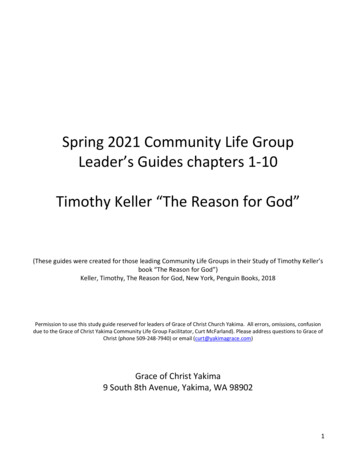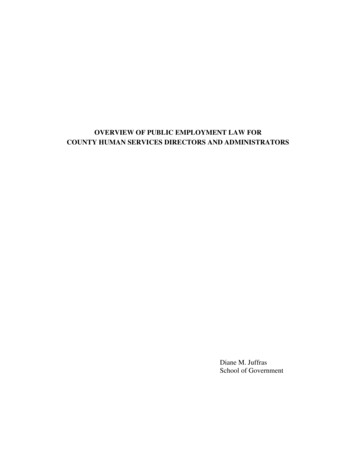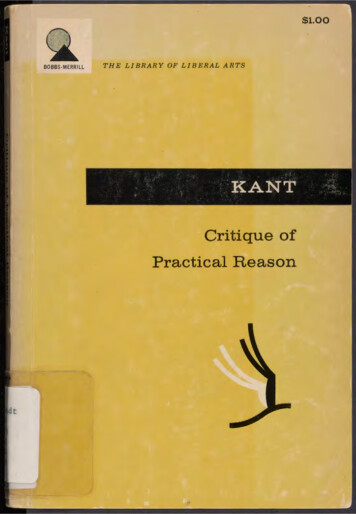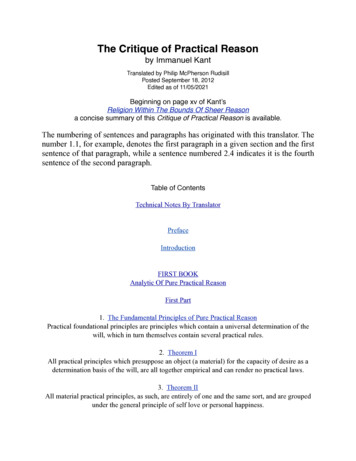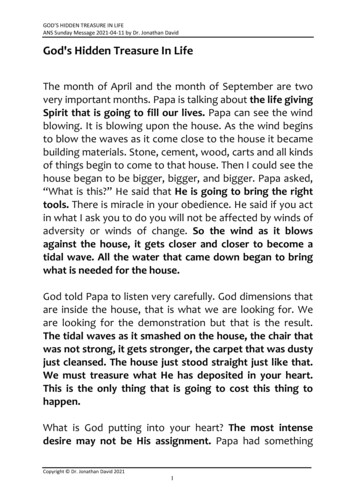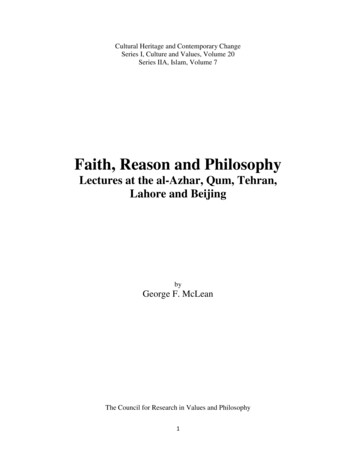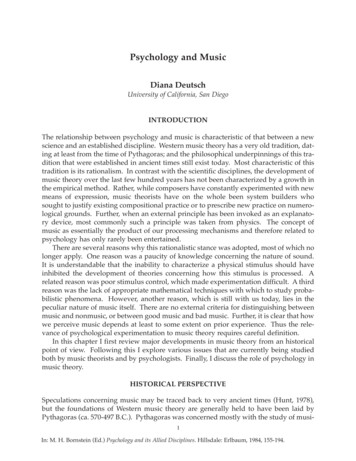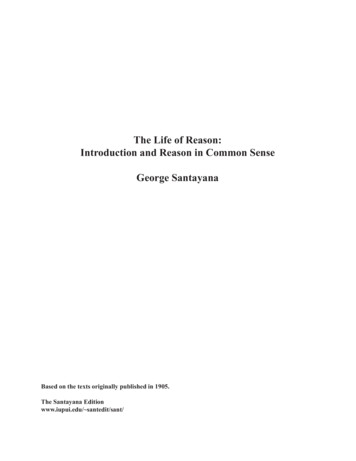
Transcription
The Life of Reason:Introduction and Reason in Common SenseGeorge SantayanaBased on the texts originally published in 1905.The Santayana Editionwww.iupui.edu/ santedit/sant/
INTRODUCTIONTHE SUBJECT OF THIS WORK, ITSMETHOD AND ANTECEDENTSWhatever forces may govern human life, if they are to be recognisedby man, must betray themselves in human experience. Progress in scienceor religion, no less than in morals and art, is a dramatic epiProgress issode in man’s career, a welcome variation in his habit and relative to anstate of mind; although this variation may often regard or ideal whichreflectionpropitiate things external, adjustment to which may be creates.important for his welfare. The importance of these externalthings, as well as their existence, he can establish only by the function andutility which a recognition of them may have in his life. The entire historyof progress is a moral drama, a tale man might unfold in a great autobiography, could his myriad heads and countless scintillas of consciousnessconspire, like the seventy Alexandrian sages, in a single version of thetruth committed to each for interpretation. What themes would prevail insuch an examination of heart? In what order and with what emphasiswould they be recounted? In which of its adventures would the humanrace, reviewing its whole experience, acknowledge a progress and a gain?To answer these questions, as they may be answered speculatively andprovisionally by an individual, is the purpose of the following work.A philosopher could hardly have a higher ambition than to make himself a mouth-piece for the memory and judgment of his race. Yet the mostcasual consideration of affairs already involves an attempt todo the same thing. Reflection is pregnant from the beginning Efficaciousreflection iswith all the principles of synthesis and valuation needed in reason.the most comprehensive criticism. So soon as man ceases tobe wholly immersed in sense, he looks before and after, he regrets anddesires; and the moments in which prospect or retrospect takes place constitute the reflective or represen-
2The Life of Reasontative part of his life, in contrast to the unmitigated flux of sensations inwhich nothing ulterior is regarded. Representation, however, can hardlyremain idle and merely speculative. To the ideal function of envisaging theabsent, memory and reflection will add (since they exist and constitute anew complication in being) the practical function of modifying the future.Vital impulse, however, when it is modified by reflection and veers insympathy with judgments pronounced on the past, is properly called reason. Man’s rational life consists in those moments in which reflection notonly occurs but proves efficacious. What is absent then works in the present, and values are imputed where they cannot be felt. Such representationis so far from being merely speculative that its presence alone can raisebodily change to the dignity of action. Reflection gathers experiencestogether and perceives their relative worth; which is as much as to say thatit expresses a new attitude of will in the presence of a world better understood and turned to some purpose. The limits of reflection mark those ofconcerted and rational action; they circumscribe the field of cumulativeexperience, or, what is the same thing, of profitable living.Thus if we use the word life in a eulogistic sense toThe Life ofdesignate the happy maintenance against the world of someReason a namedefinite ideal interest, we may say with Aristotle that life isfor all practicalthought and allreason in operation. The Life of Reason will then be a nameaction justifiedfor that part of experience which perceives and pursuesby its fruits inconsciousness.ideals—all conduct so controlled and all sense so interpreted as to perfect natural happiness.Without reason, as without memory, there might still be pleasures andpains in existence. To increase those pleasures and reduce those painswould be to introduce an improvement into the sentient world, as if a devilsuddenly died in hell or in heaven a new angel were created. Since thebeings, however, in which these values would reside, would, by hypothesis, know nothing of one another, and since the betterment would takeplace unprayed-for and unnoticed, it could hardly be called a progress; andcertainly not a progress in man, since man, without the ideal continuitygiven by memory and reason, would have no moral being. In human progress, therefore, reason is not a casual instrument, having its sole value inits service to sense; such a betterment in sentience would not be progressunless it were a progress in reason, and the increasing pleasure revealedsome object
Introduction3that could please; for without a picture of the situation from which aheightened vitality might flow, the improvement could be neither remembered nor measured nor desired. The Life of Reason is accordingly neithera mere means nor a mere incident in human progress; it is the total andembodied progress itself, in which the pleasures of sense are included inso far as they can be intelligently enjoyed and pursued. To recount man’srational moments would be to take an inventory of all his goods; for he isnot himself (as we say with unconscious accuracy) in the others. If he everappropriates them in recollection or prophecy, it is only on the ground ofsome physical relation which they may have to his being.Reason is as old as man and as prevalent as human nature; for weshould not recognise an animal to be human unless his instincts were tosome degree conscious of their ends and rendered his ideas in that measurerelevant to conduct. Many sensations, or even a whole world of dreams,do not amount to intelligence until the images in the mind begin to represent in some way, however symbolic, the forces and realities confronted inaction. There may well be intense consciousness in the total absence ofrationality. Such consciousness is suggested in dreams, in madness, andmay be found, for all we know, in the depths of universal nature. Mindspeopled only by desultory visions and lusts would not have the dignity ofhuman souls even if they seemed to pursue certain objects unerringly; forthat pursuit would not be illumined by any vision of its goal. Reason andhumanity begin with the union of instinct and ideation, when instinctbecomes enlightened, establishes values in its objects, and is turned froma process into an art, while at the same time consciousness becomes practical and cognitive, beginning to contain some symbol or record of the coordinate realities among which it arises.Reason accordingly requires the fusion of two types of life, commonlyled in the world in well-nigh total separation, one a life of impulseexpressed in affairs and social passions, the other a life of reflectionexpressed in religion, science, and the imitative arts. In the Life of Reason,if it were brought to perfection, intelligence would be at once the universalmethod of practice and its continual reward. All reflection would then beapplicable in action and all action fruitful in happiness. Though this be anideal, yet everyone gives it from time to time a partial embodiment whenhe practises useful arts, when his
4The Life of Reasonpassions happily lead him to enlightenment, or when his fancy breedsvisions pertinent to his ultimate good. Everyone leads the Life of Reasonin so far as he finds a steady light behind the world’s glitter and a clearresiduum of joy beneath pleasure or success. No experience not to berepented of falls without its sphere. Every solution to a doubt, in so far asit is not a new error, every practical achievement not neutralised by a second maladjustment consequent upon it, every consolation not the seed ofanother greater sorrow, may be gathered together and built into this edifice. The Life of Reason is the happy marriage of two elements—impulseand ideation—which if wholly divorced would reduce man to a brute or toa maniac. The rational animal is generated by the union of these two monsters. He is constituted by ideas which have ceased to be visionary andactions which have ceased to be vain.Thus the Life of Reason is another name for what, in the widest senseof the word, might be called Art. Operations become arts when their purpose is conscious and their method teachable. In perfect artIt is the sumthe whole idea is creative and exists only to be embodied,of Art.while every part of the product is rational and gives delightfulexpression to that idea. Like art, again, the Life of Reason is not a powerbut a result, the spontaneous expression of liberal genius in a favouringenvironment. Both art and reason have natural sources and meet with natural checks; but when a process is turned successfully into an art, so that itsissues have value and the ideas that accompany it become practical andcognitive, reflection, finding little that it cannot in some way justify andunderstand, begins to boast that it directs and has created the world inwhich it finds itself so much at home. Thus if art could extend its sphereto include every activity in nature, reason, being everywhere exemplified,might easily think itself omnipotent. This ideal, far as it is from actualrealisation, has so dazzled men, that in their religion and mythical philosophy they have often spoken as if it were already actual and efficient. Thisanticipation amounts, when taken seriously, to a confusion of purposeswith facts and of functions with causes, a confusion which in the interestsof wisdom and progress it is important to avoid; but these speculativefables, when we take them for what they are—poetic expressions of theideal—help us to see how deeply rooted this ideal is in man’s mind, andafford us a standard by which to measure his
Introduction5approaches to the rational perfection of which he dreams. For the Life ofReason, being the sphere of all human art, is man’s imitation of divinity.To study such an ideal, dimly expressed though it be in human existence, is no prophetic or visionary undertaking. Every genuine ideal has anatural basis; anyone may understand and safely interprethas a naturalit who is attentive to the life from which it springs. To Itbasiswhichdecipher the Life of Reason nothing is needed but an ana- makes itlytic spirit and a judicious love of man, a love quick to definable.distinguish success from failure in his great and confusedexperiment of living. The historian of reason should not be a romanticpoet, vibrating impotently to every impulse he finds afoot, without a criterion of excellence or a vision of perfection. Ideals are free, but they areneither more numerous nor more variable than the living natures that generate them. Ideals are legitimate, and each initially envisages a genuineand innocent good; but they are not realisable together, nor even singlywhen they have no deep roots in the world. Neither is the philosophercompelled by his somewhat judicial office to be a satirist or censor, without sympathy for those tentative and ingenuous passions out of which,after all, his own standards must arise. He is the chronicler of humanprogress, and to measure that progress he should be equally attentive to theimpulses that give it direction and to the circumstances amid which itstumbles toward its natural goal.There is unfortunately no school of modern philosophy to which acritique of human progress can well be attached. Almost every school,indeed, can furnish something useful to the critic, sometimes Moderna physical theory, sometimes a piece of logical analysis. We philosophy notshall need to borrow from current science and speculation the helpful.picture they draw of man’s conditions and environment, his history andmental habits. These may furnish a theatre and properties for our drama; butthey offer no hint of its plot and meaning. A great imaginative apathy hasfallen on the mind. One-half the learned world is amused in tinkering obsolete armour, as Don Quixote did his helmet; deputing it, after a series ofcatastrophes, to be at last sound and invulnerable. The other half, the naturalists who have studied psychology and evolution, look at life from theoutside, and the processes of Nature make them forget her uses. Baconindeed had
6The Life of Reasonprized science for adding to the comforts of life, a function still commemorated by positivists in their eloquent moments.Positivism noHabitually, however, when they utter the word progress itpositive ideal.is, in their mouths, a synonym for inevitable change, or atbest for change in that direction which they conceive to be on the wholepredominant. If they combine with physical speculation some elements ofmorals, these are usually purely formal, to the effect that happiness is tobe pursued (probably, alas! because to do so is a psychological law); butwhat happiness consists in we gather only from casual observations or byputting together their national prejudices and party saws.The truth is that even this radical school, emancipated as it thinksitself, is suffering from the after-effects of supernaturalism. Like childrenescaped from school, they find their whole happiness in freedom. They areproud of what they have rejected, as if a great wit were required to do so;but they do not know what they want. If you astonish them by demandingwhat is their positive ideal, further than that there should be a great manypeople and that they should be all alike, they will say at first that whatought to be is obvious, and later they will submit the matter to a majorityvote. They have discarded the machinery in which their ancestors embodied the ideal; they have not perceived that those symbols stood for the Lifeof Reason and gave fantastic and embarrassed expression to what, in itself,is pure humanity; and they have thus remained entangled in the colossalerror that ideals are something adventitious and unmeaning, not having asoil in mortal life nor a possible fulfilment there.The profound and pathetic ideas which inspired Christianity wereattached in the beginning to ancient myths and soon crystallised into manynew ones. The mythical manner pervades Christian phiChristianlosophy; but myth succeeds in expressing ideal life only byphilosophymythical: itmisrepresenting its history and conditions. This methodmisrepresentswas indeed not original with the Fathers; they borrowed itfacts andconditions.from Plato, who appealed to parables himself in an openand harmless fashion, yet with disastrous consequences tohis school. Nor was he the first; for the instinct to regard poetic fictions asrevelations of supernatural facts is as old as the soul’s primitive incapacityto distinguish dreams from waking perceptions, sign from thing signified,and inner emotions
Introduction7from external powers. Such confusions, though in a way they obey moralforces, make a rational estimate of things impossible. To misrepresent theconditions and consequences of action is no merely speculative error; itinvolves a false emphasis in character and an artificial balance and coordination among human pursuits. When ideals are hypostasised into powers alleged to provide for their own expression, the Life of Reason cannotbe conceived; in theory its field of operation is pre-empted and its functiongone, while in practice its inner impulses are turned awry by artificialstimulation and repression.The Patristic systems, though weak in their foundations, were extraordinarily wise and comprehensive in their working out; and while theyinverted life they preserved it. Dogma added to the universe fabulousperspectives; it interpolated also innumerable incidents and powers whichgave a new dimension to experience. Yet the old world remained standingin its strange setting, like the Pantheon in modern Rome; and, what is moreimportant, the natural springs of human action were still acknowledged,and if a supernatural discipline was imposed, it was only because experience and faith had disclosed a situation in which the pursuit of earthlyhappiness seemed hopeless. Nature was not destroyed by its novel appendages, nor did reason die in the cloister: it hibernated there, and could comeback to its own in due season, only a little dazed and weakened by its longconfinement. Such, at least, is the situation in Catholic regions, where thePatristic philosophy has not appreciably varied. Among ProtestantsChristian dogma has taken a new and ambiguous direction, which has atonce minimised its disturbing effect in practice and isolated its primaryillusion. The symptoms have been cured and the disease driven in.The tenets of Protestant bodies are notoriously varied and on principlesubject to change. There is hardly a combination of tradition and spontaneity which has not been tried in some quarter. If we think, Liberal theologyhowever, of broad tendencies and ultimate issues, it a superstitioustoward aappears that in Protestantism myth, without disappearing, attitudenatural world.has changed its relation to reality: instead of being anextension to the natural world myth has become its substratum. Religion no longer reveals divine personalities, future rewards,and tenderer Elysian consolations; nor
8The Life of Reasondoes it seriously propose a heaven to be reached by a ladder nor a purgatory to be shortened by prescribed devotions. It merely gives the real worldan ideal status and teaches men to accept a natural life on supernaturalgrounds. The consequence is that the most pious can give an unvarnisheddescription of things. Even immortality and the idea of God are submitted,in liberal circles, to scientific treatment. On the other hand, it would behard to conceive a more inveterate obsession than that which keeps theattitude of these same minds inappropriate to the objects they envisage.They have accepted natural conditions; they will not accept natural ideals.The Life of Reason has no existence for them, because, although its fieldis clear, they will not tolerate any human or finite standard of value, andwill not suffer extant interests, which can alone guide them in action orjudgment, to define the worth of life.The after-effects of Hebraism are here contrary to its foundations; forthe Jews loved the world so much that they brought themselves, in orderto win and enjoy it, to an intense concentration of purpose; but this effortand discipline, which had of course been mythically sanctioned, not onlyfailed of its object, but grew far too absolute and sublime to think its objectcould ever have been earthly; and the supernatural machinery which wasto have secured prosperity, while that still enticed, now had to furnishsome worthier object for the passion it had artificially fostered. Fanaticismconsists in redoubling your effort when you have forgotten your aim.An earnestness which is out of proportion to any knowledge or love ofreal things, which is therefore dark and inward and thinks itself deeperthan the earth’s foundations—such an earnestness, until culture turns itinto intelligent interests, will naturally breed a new mythology. It will tryto place some world of Afrites and shadowy giants behind the constellations, which it finds too distinct and constant to be its companions or supporters; and it will assign to itself vague and infinite tasks, for which it isdoubtless better equipped than for those which the earth now sets beforeit. Even these, however, since they are parts of an infinite whole, the mystic may (histrionically, perhaps, yet zealously) undertake; but as his eyewill be perpetually fixed on something invisible beyond, and nothing willbe done for its own sake or enjoyed in its own fugitive presence, there willbe little art and little joy in existence. All will be a tossing servitude andilliberal mist,
Introduction9where the parts will have no final values and the whole no pertinentdirection.In Greek philosophy the situation is far more auspicious. The ancientsled a rational life and envisaged the various spheres of speculation as menmight whose central interests were rational. In physicsGreeksthey leaped at once to the conception of a dynamic unity Thethought straightand general evolution, thus giving that background to in both physicshuman life which shrewd observation would always have and morals.descried, and which modern science has laboriously rediscovered. Two great systems offered, in two legitimate directions, what aredoubtless the final and radical accounts of physical being. Heraclitus,describing the immediate, found it to be in constant and pervasive change:no substances, no forms, no identities could be arrested Heraclitus andthere, but as in the human soul, so in nature, all was insta- the immediate.bility, contradiction, reconstruction, and oblivion. Thisremains the empirical fact; and we need but to rescind the artificial division which Descartes has taught us to make between nature and life, to feelagain the absolute aptness of Heraclitus’s expressions. These were thoughtobscure only because they were so disconcertingly penetrating and direct.The immediate is what nobody sees, because convention and reflectionturn existence, as soon as they can, into ideas; a man who discloses theimmediate seems profound, yet his depth is nothing but innocence recovered and a sort of intellectual abstention. Mysticism, scepticism, and transcendentalism have all in their various ways tried to fall back on theimmediate; but none of them has been ingenuous enough. Each has addedsome myth, or sophistry, or delusive artifice to its direct observation.Heraclitus remains the honest prophet of immediacy: a mystic withoutraptures or bad rhetoric, a sceptic who does not rely for his results on conventions unwittingly adopted, a transcendentalist without false pretensionsor incongruous dogmas.The immediate is not, however, a good subject for discourse, and theexpounders of Heraclitus were not unnaturally blamed for monotony. Allthey could do was to iterate their master’s maxim, and declare everythingto be in flux. In suggesting laws of recurrence and a reason in which whatis common to many might be expressed, Heraclitus had opened the doorinto another region: had he passed through, his philosophy would havebeen greatly modified, for per-
10The Life of Reasonmanent forms would have forced themselves on his attention no less thanshifting materials. Such a Heraclitus would have anticipated Plato; but thetime for such a synthesis had not yet arrived.At the opposite pole from immediacy lies intelligibility. To reducephenomena to constant elements, as similar and simple as possible, and toconceive their union and separation to obey constant laws,Democritus andis what a natural philosopher will inevitably do so soon asthe naturallyhis interest is not merely to utter experience but to underintelligible.stand it. Democritus brought this scientific ideal to itsultimate expression. By including psychic existence in his atomic system,he indicated a problem which natural science has since practically abandoned but which it may some day be compelled to take up. The atoms ofDemocritus seem to us gross, even for chemistry, and their quality wouldhave to undergo great transformation if they were to support intelligiblypsychic being as well; but that very grossness and false simplicity had itsmerits, and science must be for ever grateful to the man who at its inception could so clearly formulate its mechanical ideal. That the world is notso intelligible as we could wish is not to be wondered at. In other respectsalso it fails to respond to our ideals; yet our hope must be to find it morepropitious to the intellect as well as to all the arts in proportion as we learnbetter how to live in it.The atoms of what we call hydrogen or oxygen may well turn out tobe worlds, as the stars are which make atoms for astronomy. Their innerorganisation might be negligible on our rude plane of being; did it discloseitself, however, it would be intelligible in its turn only if constant parts andconstant laws were discernible within each system. So that while atomismat a given level may not be a final or metaphysical truth, it will describe,on every level, the practical and efficacious structure of the world. We oweto Democritus this ideal of practical intelligibility; and he is accordinglyan eternal spokesman of reason. His system, long buried with other gloriesof the world, has been partly revived; and although it cannot be verified inhaste, for it represents an ultimate ideal, every advance in science reconstitutes it in some particular. Mechanism is not one principle of explanation among others. In natural philosophy, where to explain means todiscover origins, transmutations, and laws, mechanism is explanationitself.
Introduction11Heraclitus had the good fortune of having his physics absorbed byPlato. It is a pity that Democritus’ physics was not absorbed by Aristotle.For with the flux observed, and mechanism conceived to explain it, thetheory of existence is complete; and had a complete physical theory beenincorporated into the Socratic philosophy, wisdom would have lackednone of its parts. Democritus, however, appeared too late, when ideal science had overrun the whole field and initiated a verbal and dialecticalphysics; so that Aristotle, for all his scientific temper and studies, built hisnatural philosophy on a lamentable misunderstanding, and condemnedthought to confusion for two thousand years.If the happy freedom of the Greeks from religious dogma made themthe first natural philosophers, their happy political freedom made them thefirst moralists. It was no accident that Socrates walked theSocrates and theAthenian agora; it was no petty patriotism that made him autonomy ofshrink from any other scene. His science had its roots mind.there, in the personal independence, intellectual vivacity,and clever dialectic of his countrymen. Ideal science lives in discourse; itconsists in the active exercise of reason, in signification, appreciation,intent, and self-expression. Its sum total is to know oneself, not as psychology or anthropology might describe a man, but to know, as the saying is,one’s own mind. Nor is he who knows his own mind forbidden to changeit; the dialectician has nothing to do with future possibilities or with theopinion of anyone but the man addressed. This kind of truth is but adequate veracity; its only object is its own intent. Having developed in thespirit the consciousness of its meanings and purposes, Socrates rescuedlogic and ethics for ever from authority. With his friends the Sophists, hemade man the measure of all things, after bidding him measure himself, asthey neglected to do, by his own ideal. That brave humanity which hadfirst raised its head in Hellas and had endowed so many things in heavenand earth, where everything was hitherto monstrous, with proportion anduse, so that man’s works might justify themselves to his mind, now foundin Socrates its precise definition; and it was naturally where the Life ofReason had been long cultivated that it came finally to be conceived.Socrates had, however, a plebeian strain in his humanity, and his utilitarianism, at least in its expression, hardly did justice to what gives
12The Life of Reasonutility to life. His condemnation for atheism—if we choose to take it symbolically—was not altogether unjust: the gods of Greece were not honoured explicitly enough in his philosophy. Human goodPlato gave theappeared there in its principle; you would not set a pilot toideal its fullmend shoes, because you knew your own purpose; butexpression.what purposes a civilised soul might harbour, and in whathighest shapes the good might appear, was a problem that seems not tohave attracted his genius. It was reserved to Plato to bring the Socraticethics to its sublimest expression and to elicit from the depths of the Greekconscience those ancestral ideals which had inspired its legislators andbeen embodied in its sacred civic traditions. The owl of Minerva flew, asHegel says, in the dusk of evening; and it was horror at the abandonmentof all creative virtues that brought Plato to conceive them so sharply andto preach them in so sad a tone. It was after all but the love of beauty thatmade him censure the poets; for like a true Greek and a true lover hewished to see beauty flourish in the real world. It was love of freedom thatmade him harsh to his ideal citizens, that they might be strong enough topreserve the liberal life. And when he broke away from political preoccupations and turned to the inner life, his interpretations proved the absolute sufficiency of the Socratic method; and he left nothing pertinentunsaid on ideal love and ideal immortality.Beyond this point no rendering of the Life of Reason has ever beencarried. Aristotle improved the detail, and gave breadth and precision tomany a part. If Plato possessed greater imaginative splenAristotledour and more enthusiasm in austerity, Aristotle had perfectsupplied itsnatural basis.sobriety and adequacy, with greater fidelity to the commonsentiments of his race. Plato, by virtue of his scope andplasticity, together with a certain prophetic zeal, outran at times the limitsof the Hellenic and the rational; he saw human virtue so surrounded andoppressed by physical dangers that he wished to give it mythical sanctions,and his fondness for transmigration and nether punishments was somewhat more than playful. If as a work of imagination his philosophy holdsthe first place, Aristotle’s has the decisive advantage of being the unalloyed expression of reason. In Aristotle the conception of human nature isperfectly sound; everything ideal has a natural basis and everything naturalan ideal development. His ethics, when thoroughly digested
Introduction13and weighed, especially when the meagre outlines are filled in with Plato’smore discursive expositions, will seem therefore entirely final. The Life ofReason finds there its classic explication.A
designate the happy maintenance against the world of some definite ideal interest, we may say with Aristotle that life is reason in operation. The Life of Reason will then be a name for that part of experience which perceives and pursues ideals—all conduct so controlled and a

